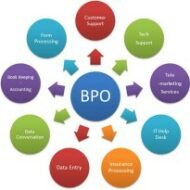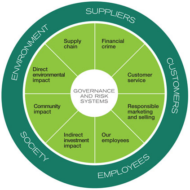Posted by Managementguru in Business Management, Human Resource, Organisational behaviour, Principles of Management, Project Management, Training & Development
on Mar 19th, 2014 | 0 comments

Call Centre Challenges The emergence of numerous “call centers” in developing countries like India and China, has posed some serious threats to the employees of these concerns. The concept of call center is a new find of the modern era, where they handle volumes of business process outsourcing for the developed countries. What are the various operations carried on in a call center? They handle inbound and outbound customer care services, telemarketing services, e-mail management services, pay roll accounting, help desk and many more back end activities. Benefits of Outsourcing: It proves to be a win-win situation for both the parties; the outsourcing company benefits from cheap labor, and the company that does the job earns good pay in the form of foreign exchange. But one has to understand the nuances of the call center operations; how it can be really worked out to one’s benefit? If you have a direct link with the outsourcing company, there is no need for you to share the profit. If the job is sublet to you, then your share gets reduced down the line. And also, the pay comes in a cycle of 45 days or so. So, it becomes mandatory that you should have the wherewithal to rotate your own funds for that 45 day period time, to fulfill establishment costs, power costs, salary and other miscellaneous expenses. What is the Pressure Situation? Let’s not get into the details of how to establish a call center and the necessary infrastructure to start one. The business has created a pressure situation, as it calls for erratic work hours and disturbed eating and sleep patterns. Definitely, it affects the youth, who form the major population of call centers, psychologically and socially as well. The erratic work schedules, (they work round the clock in shifts) the intense work pressure to achieve targets eventually leads to a pressure cooker like stress situation. Their altered sleep cycle is dangerous to both their physical and mental health. It is an evident fact that more number of persons working in this industry has started complaining about their physical and mental problems like Anxiety Depression Relationship-related problems Headaches Disturbed appetite Hearing loss Changes in thyroid and adrenaline levels Loss of weight Obesity and Smoking to reduce immense tension is also witnessed. The call center business has been a flourishing business in developing nations, though recently we tend to see a lull in the market, owing to the government regulations of the developed nations. Even the economy of developed countries, has taken a huge plunge owing to the recent economic recession. Naturally, when their financial markets have become unstable, they would not want to outsource to low-cost developing countries. The BPO’s or KPO’s (business process outsourcing and knowledge process outsourcing), as they are called should not become a fad, instead, developing nations can also concentrate on indigenous business clients, that are in need of their services. Note: India is the leading country for offshore outsourcing. The offshore outsourcing industry started in India and it has been able to grow the IT and BPO export sector to $47 billion and capture more than half the offshore outsourcing...

Posted by Managementguru in Business Ethics, Business Management, Principles of Management, Strategy
on Mar 15th, 2014 | 0 comments

Social Value of Corporate Companies Economic Responsibilities: Ethical and discretionary responsibilities of a business firm are listed in the order of priority. First, a firm has to satisfy its economic responsibilities, followed by fulfilling legal responsibilities in order to survive in the market. Only then, it can think about or focus on purely voluntary actions pertaining to ethical consideration. In this competitive market situation, a business unit has to concentrate on profit making, the primary motive behind any business activity. However; it is easier said than done. You cannot hit the bull’s eye at the very first attempt. A firm has to become economically stable first; only then, it integrates social commitments in its agenda. Arguments for social responsibility: Public image: Socially responsible firms gain more customers and employees feel proud to work for such organizations. Handling the government regulations with ease: Government is a massive institution with long arms. It seeks to regulate business in public interest. Before government stretches its long arms, business persons should discharge their obligations to society. Business is resourceful: With a pool of resources, such as capital, labor and expertise, business is in a better position to tackle social problems and work for social goals. Let business try: It is that many other institutions have failed in handling social problems. So why should not a business enterprise handle social problems? Prevention is better than cure: Social problems have to be handled by the management at some point of time or the other. Problems with labor unions should be handled in a diplomatic way, so that they will not develop into serious social breakdown that consumes most of the management’s time. As a token of gratitude: Business units benefit from society. Based on the commonly accepted principle, that one owes debts of gratitude towards those who benefits us, the corporations have debts that it owes to society. Arguments against social responsibility: Profit maximization is the ultimate goal: Business units are accused of having profit maximization as their goal. Since business operates in a world of poverty and hunger, the economic efficiency of business is a matter of priority and should be the sole mission of business. Society has to pay the cost: The costs of social responsibility will be passed on to the society and the question is can the society bear these additional costs? Lack of social skills: Managers are here to solve economic problems and they do not possess knowledge or skills to provide the right solutions for social problems. Business has enough power: Business already is wielded with enough social power. The society should not take any steps, which will make it stronger. Social overhead costs: Costs on social responsibility is considered a social cost, which will not immediately benefit the business. Why spend money on an object, the benefits of which will be relished only in the future. Lack of broad support: The idea of business involvement in achieving social goals is not widely supported by many groups in society. Business and society are interlinked in many ways and the business has to handle the societal aspects with great care or else it may have to face the consequences arising out of such misappropriation or...

Posted by Managementguru in Business Ethics, Business Management, CSR, Entrepreneurship, Principles of Management
on Mar 15th, 2014 | 0 comments
![Code of Ethics]()
Institutionalize Your Code of Ethics Business Ethics is a term we often come across in the world of corporate business. Ethics generally distinguishes between the right and the wrong. But you might argue, what is right for one person may not be for the other. “True! But there are certain principles that are widely accepted by everyone that guides the behavior of individuals or a business enterprise. Shall we say that Business Ethics is an UNWRITTEN CODE OF CONDUCT which governs the conduct of a business enterprise and also helps it in reaching the right decision? CSR CORPORATE SOCIAL RESPONSIBILITY comes into the big picture when you talk about business or professional ethics. When a person gears up himself to start a business, he studies the market as to how supportive it would be to carry on his business. He segments the market, evaluates the demography, approaches financial institutions like banks for loans, creates a big cacophony about the government’s red tapism to acquire licenses to do his business and when all these criteria accords a green signal he ventures into the market with a confidence that is backed up by all the above factors. Say by the end of the first year, he has done great business and the time has come for income tax or sales tax payments, a small voice cuckoos from within, asking him to think twice or to venture the possibilities of EVADING TAX. Once he tastes the essence of success and the POWER OF MONEY he deviates from the RIGHT CONDUCT and BEHAVIOR. He conveniently abstains himself from performing his duties towards customers, employees, government, share holders, stake holders and others. Mind you, being ethical is a statutory phenomenon and not a thing to be taken for granted. If your motivation and effort is oriented only TOWARDS PROFIT, thriving longer in the market will become a matter of concern. Every action has an equal and opposite reaction: “Whatever is that you take, you have to repay.”This is applicable both in personal life as well in business. Yogis’ have ascertained the fact time and again that you have to dissolve your karma or past actions to be a liberated soul. Neo world scientists also second this thought,” every action has an equal and opposite reaction. “Being ethical is not that demanding or tough as you have conceived it to be. In simpler terms, it even teaches you to be highly compassionate towards your fellowmen. Various aspects affecting ethical behavior in a business organization would be: Policies regarding moral duty and obligation Accounting ethics Corporate culture Ethics in management development programmes Dealing with “gray areas” Disciplinary procedures Review and updating the ethical code Increased concern about the well informed public Government regulations Value based management practices Enlightening the managers of top cadre Rewards and recognitions for people with right conduct and the list goes on and on. Corruptions, Bribery, Black marketing are some of the JARGONS that are strictly prohibited words and actions in the dictionary of ethics. Sound ethical practices not only create an IMAGE for your company, but also the recognition among your own employees that you could relish. Being ethical is not that difficult, only that it calls for undeterred determination and inbuilt...

Posted by Managementguru in Human Resource, Labor Management, Training & Development
on Mar 9th, 2014 | 0 comments

HR Selection Process and Techniques Following the process of recruitment is selection, where the management has to select the right employees at the right time. The intention is to choose appropriate candidates for the unfilled spots and to avoid commitments to those whom the management thinks will not work well. The best qualified individuals from the pool find their place whose qualifications match the job specifications. What is the Selection Process in Human Resource Management? Selection process depends upon the · Size of the company · Nature of the business · Kind and Number of persons to be employed · Government regulations to be followed etc. The process includes 1. Collection of data about the candidate’s qualification 2. Experience 3. Physical and mental ability 4. Nature and Behavior 5. Aptitude and the like Steps in Scientific Selection Process: A. Job Analysis: This is the basic step for finding the right candidate and each organization should lay down job analysis, job description and job specification with clarity in order to lure the right candidates for selection. B. Recruitment: Process of searching for prospective employees and stimulating them to apply for jobs in the organization. C. Application Form: This is also known as the application blank. This facilitates collecting detailed information from the prospective employees regarding their age, gender, family details, qualification, skills, experience, achievements etc. This is widely used to screen employees at the preliminary level. D. Written Examinations: are conducted to gauge the · Mathematical ability · Aptitude · Reasoning · Knowledge in various disciplines · General Knowledge and · English language abilities of the candidates. E. Preliminary Interview: This is suitable to eliminate the undesirable and unsuitable candidates and also to gather personal information from the candidates on a one to one basis. F. Group Discussion: Group discussions help the management to pick out bright candidates from among the group members and also the ability of each individual to adjust to the group. Each group is expected to analyze, interpret and find alternate solutions and select the best solution for a particular case study or subject matter. G. Tests: To further assess the skills of the employees the management conducts different kinds of tests. H. Final Interview: This is the most essential step in the process of selection. The interviewer matches the information obtained about the candidate through the application with that of his own observation and questioning. · Informal · Formal · Planned · Patterned · Non-Directive · Depth · Stress · Group and · Panel interviews are some of the types of interviews conducted in accordance with the job requirement. Also See: Interview Preparation Tips I. Medical Examination: Certain jobs require certain physical qualities like clear vision, perfect hearing, unusual stamina, tolerance of hard working conditions, clear tone etc. J. Reference Checks: The personnel department will engage in checking reference if the candidate passes all the tests and found suitable for the job. What kind of Companies the Employees are Attracted to – Here is an interesting infographic on “How to Attract the Perfect Employee”...

Posted by Managementguru in Entrepreneurship, Project Management
on Mar 6th, 2014 | 0 comments

How can we define Business? Business is an important institution in the society. Be it for the supply of goods and services; Creation of employment opportunities; Offering better quality of life; Contribution to the economic growth of a country; the role of business is crucial. The subject of business is as interesting as its role in society. The more one reads about it, more interesting does business become. To be successful, you have to have your heart in your business, and your business in your heart. – Thomas Watson Sr. Entrepreneurial activities The increasing number of business schools and institutions signify the importance and the need for training the students on rudiments of business management. Developing countries encourage entrepreneurial activities and view it as a strategy to improve the GDP (Gross Domestic Product). More business activity means increased per capita income and increased standard of living. A business must make profit to succeed. Profit is income minus outgo. It is the main incentive for starting a business. Business people weigh each of their decisions in terms of making profit and avoiding loss. In a corporate environment, business has to aim for wealth maximization apart from profit maximization to increase the shareholder’s wealth in the long run. The scope of business is indeed vast. It all depends on how well you have analyzed and understood the nuances of your business activity, in order to survive and sustain in the market. Supply Chain The supply chain in a business activity involves numerous links in the form of manufacturers, supplier of raw materials to the manufacturer, dealers, logistics, intermediaries, consumers, bankers, advertising agencies, insurance agencies and so on. All these elements have to function in a coordinated manner for the benefit of the consumer. Now days, business has become customer-centric rather than product-centric. This serves both the purpose of product development in lieu of customer needs and customer satisfaction. The multitudinous activities involved in bringing raw materials to the factory and the end product from there to the market constitute business. In addition, a business activity has to comply with legal restrictions and government regulations. A business is also expected to discharge its social obligations to consumers, employees, owners and to other interest groups, which have stakes in business directly or indirectly. Planning and organization Planning and organization are two key principles in running a business enterprise as planning sets up a concrete premise on which action plans can be developed and organized activities assures definite success. Modern business is dynamic. Future business will be knowledge based and brainpower will be in greater demand. Organizations have become flat. Eight to twelve organizational layers have been reduced to two or three. Gone are the days of sheltered markets, subsidies, licenses, quotas and restrictions. Businesspersons are asked to stand on their feet, to eliminate inefficiencies, cut down costs and improve productivity. LoL! It might be said that it is the ideal of the employer to have production without employees and the ideal of the employee is to have income without work. –E. F....









